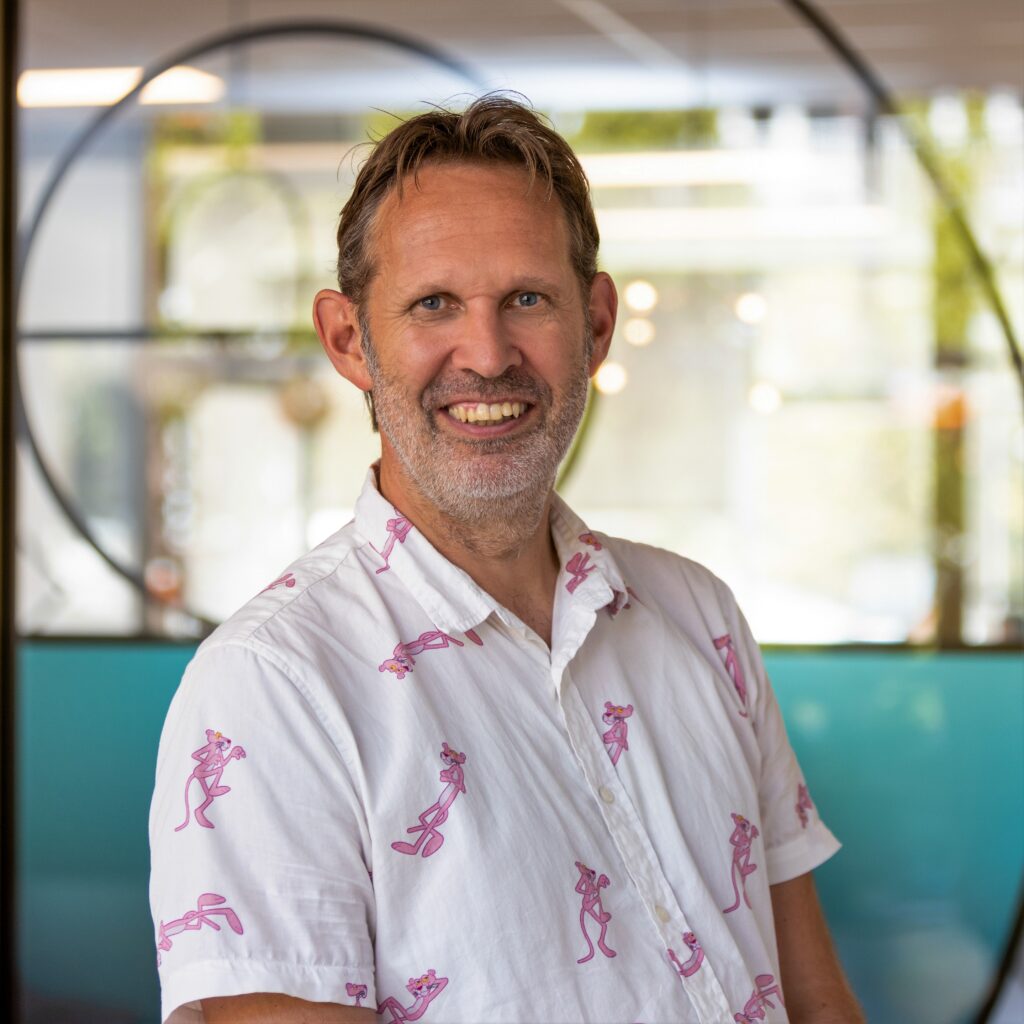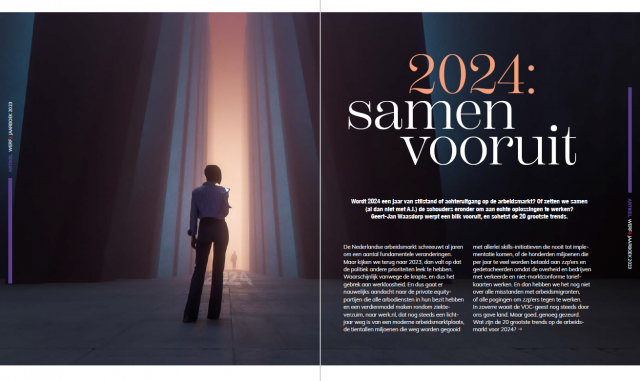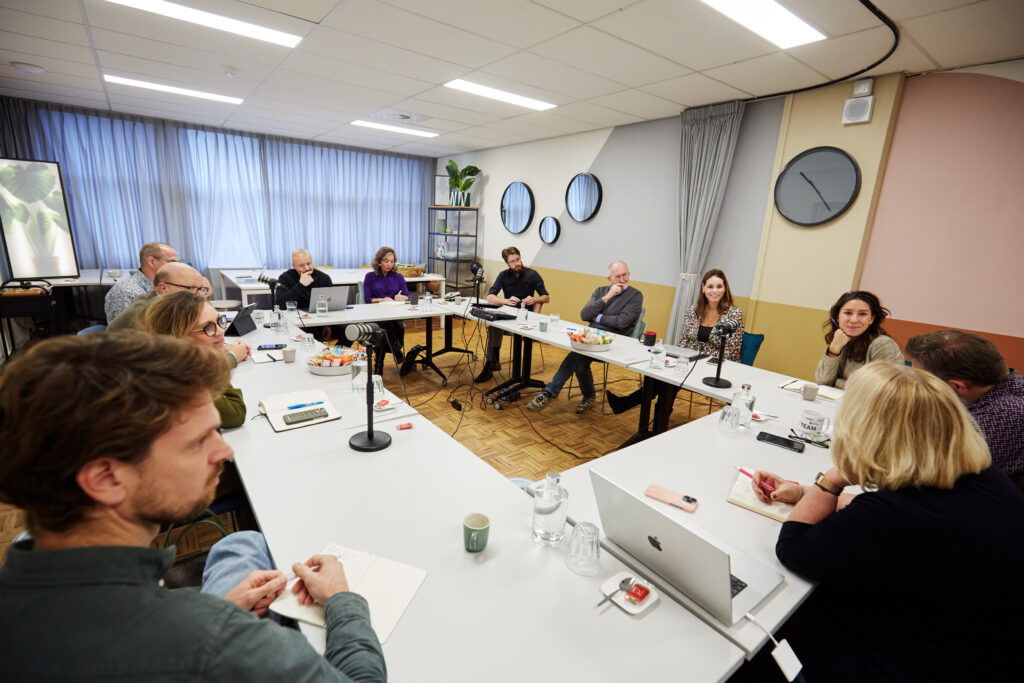
The major shortages continued in 2023, with plenty of employers who spared no effort to show their best side to the labor market. But what were the most important and striking developments? Is employer branding finally being taken seriously? And what can we tell from that? And are they already afraid of the possibilities of AI within employer branding? Ten experts are happy to discuss this in this third round table session on developments in the recruitment field, with this time an emphasis on labor market communication.
#1. Heroic act in 2023
Jari Kloppenburg ( SteamTalmark ): ‘We recently won a Lamp, an ADCN Award. Winning a prize in itself is of course not a heroic act, but the reason why was in this case for me. We won the prize for the Police’s diversity campaign. For me, that is a good example of the impact that labor market communication can have. And for me that immediately illustrates the importance of this profession: it is about something.’
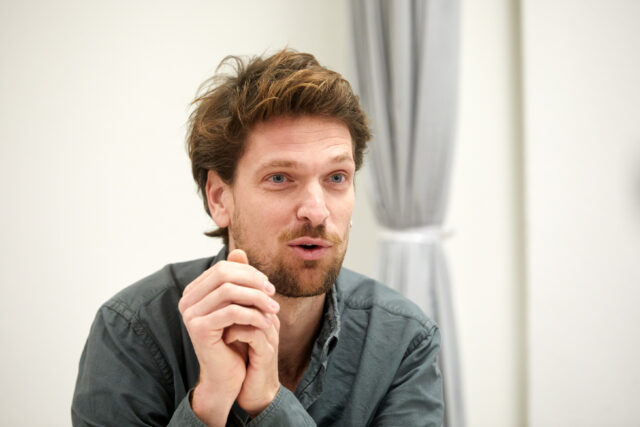
Alix Hensen Verbaten ( BRANDMANNEN ): ‘We were really able to make a difference. At Digitaal-Werven we met a woman who came to the Netherlands years ago as a political refugee. Although she has been integrated for years, she was unable to find a job in her area of expertise. We then helped her with her CV and put her in touch with the right people from our network. That makes me proud of how we act at Brandmannen.’
‘25% of applicants to the Public Prosecution Service now come through our sourcing.’
Milou Verhoeks ( Cooble ): ‘The Public Prosecution Service is one of our clients. There is a major officer shortage there, which is a really important issue for the Netherlands. 25% of applicants now arrive there through our sourcing. Diversity also plays a major role in this. When we started we had 8% diversity in the candidates, now it is 34%. So you see that you can also achieve socially beneficial results with sourcing.’
‘Making choices pays off’
Ton Rodenburg ( ClubgeistBVH ): ‘I see that a lot of generic rubbish is made in our profession. With respect, don’t get me wrong. But for me a highlight this year, a heroic act, if you like, was that we presented to KPN, and that our creatives cut through with one idea. For me it is also a recognition that it pays to make choices, speak out as an employer, so that people can make a good choice for a company. This will only make the labor market better, I am convinced of that.’
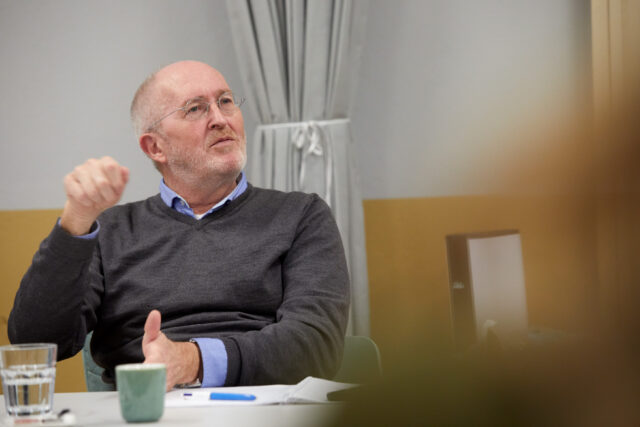
Wander Wierda ( Loyall/SendtoDeliver ) : ‘I recently had contact with an organization that mainly recruits directors in education. About 4 years ago they still did this through vacancies in the NRC, but the manager now wants to accelerate. At first I really had to explain why the newspaper was not effective, but now he comes asking for it himself. I now see this change in the recruitment of organizations that really want to be of significance in society a lot more around me. It’s nice to be able to contribute to that.’
‘I see many organizations around me that really want to be of significance in society.’
Vanessa Backer ( AdverOnline ): ‘I stand for job satisfaction and job satisfaction. Last year I spent a lot of time asking: are the people in the right place with us? I also think that is quite a heroic act. We have been able to make many shifts, and now we have a team of experts that really sparkles again, in a beautiful new building. I’m proud of that.’
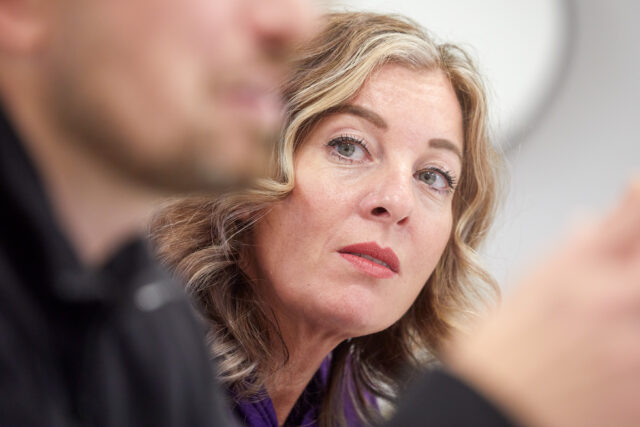
Koen Roozen ( HetRecruitingKantoor ): ‘I think I’ll also keep it internal. Over the past year, we as an agency have developed our own employer brand; ‘ Masters in recruitment ‘. Now you see that everyone is embracing that idea, it has become a unifying theme throughout the organization. That has been a journey, but I also think it is a heroic act.’
A whole group of heroes
Remko Booghmans ( Recruitment Marketeers ) : ‘We work a lot for SMEs, municipalities, environmental services, water boards. Organizations that often find it difficult to compete against the big boys. I am proud that with a group of 14 professionals we can do a lot for such organizations and now structurally serve more than 50 municipalities and help them fill their vacancies.’
‘I am proud that I see more and more people being loyal to the profession.’
Peer Goudsmit ( RecruitAgent.ai ) : ‘It is always difficult to name a heroic act of your own. I am proud that I look around here and see that more and more people are loyal to the profession. Recruitment is really starting to get serious in that sense. A whole group of heroes. My own heroic act? I think that is the step into the unknown that we have taken with our new AI tool. Very exciting.’

Michelle Schroen ( iD employer marketing & media ): ‘I have 4 children. I hope that they consider it a heroic act that I took the step to establish this company 2 years ago, and that I convey that they should dare to take a step if they believe in something.’
#2. AI
Verhoeks : ‘You already saw the trend coming last year. You knew: if that happens, it will really do something. With us, everyone was on ChatGPT within one week.’
‘AI has exposed a generation gap.’
Goudsmit : ‘It has exposed a generation gap.’
Verhoeks : ‘Well, I also have friends who say: I find it quite scary.’
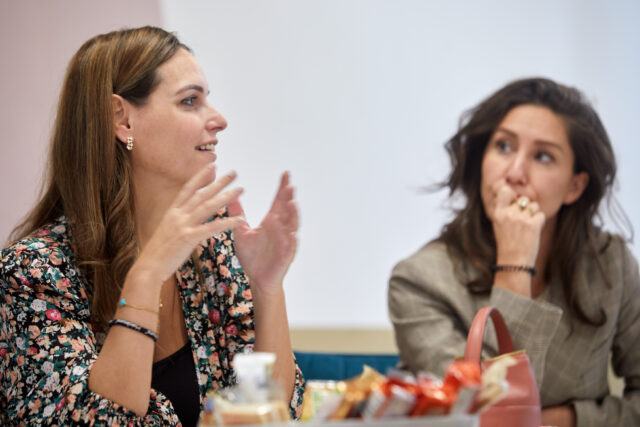
Backer : ‘Many of our customers are also quite anxious. But I think we will see many more new initiatives in the coming year.’
‘I see a lot of people who talk about AI, and a lot fewer who actually do something with it.’
Verhoeks : ‘Customers mainly want to hear from us whether we are already doing something with it. Then they want to be able to say through us that they are also doing something with it. I see it mainly as a tool, not as something that can solve everything. In addition, I also see a lot of people who talk about it, and a lot fewer who actually do something with it.’
Goudsmit : ‘The number of self-proclaimed experts is indeed growing rapidly. That could have an adverse effect, I fear.’
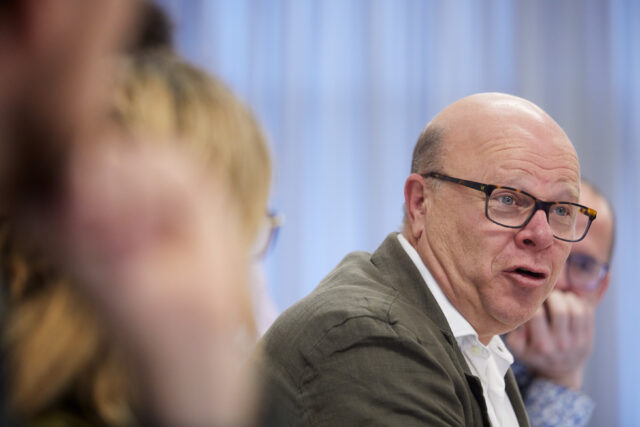
Verhoeks : ‘I am semi-anti myself. Because if you do it automatically, candidates will turn away from you.’
‘If you start doing it all automatically, candidates will turn away from you.’
Roozen : ‘All those instruments at your disposal can also expose your lack of vision and strategy. If it doesn’t fit into a bigger plan, then what are you moving towards? I see many posts on LinkedIn where it is clear that ChatGPT wrote them. But where does that lead? Without a goal you reach the wrong place. AI will only ensure that you get there faster.’
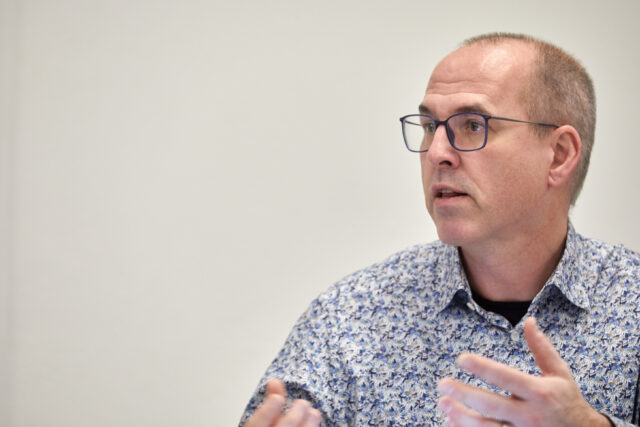
Kloppenburg : ‘The genie is out of the bottle. This isn’t going away anymore. From a creative perspective, I am critical of its use. If you ask AI to generate an image, it is often extremely stereotypical. Moreover, Marleen Stikker already said: why would you let a computer do what you enjoy doing most? I sometimes miss that critical note.’
Rodenburg : ‘It is increasingly becoming an ordinary part of the toolkit. It works like crazy for designers, especially in the digital sketching phase. Then it can certainly help. ChatGPT is also a useful tool for me to organize your own brainstorming.’
‘ChatGPT is also a useful tool for me to organize your own brainstorming.’
Kloppenburg : ‘Of course, we also experiment with it. And also benefit from it. But you must always be careful not to turn a means into an end.’
Making smaller
Hensen Verbaten : ‘For many customers it is so big. AI, oh my god ! I often try to make it smaller. Like: ask a question you ask Google to ChatGPT. And try to give an order from there. Such as: “write a vacancy text with the following information.” Then it becomes more tangible.’
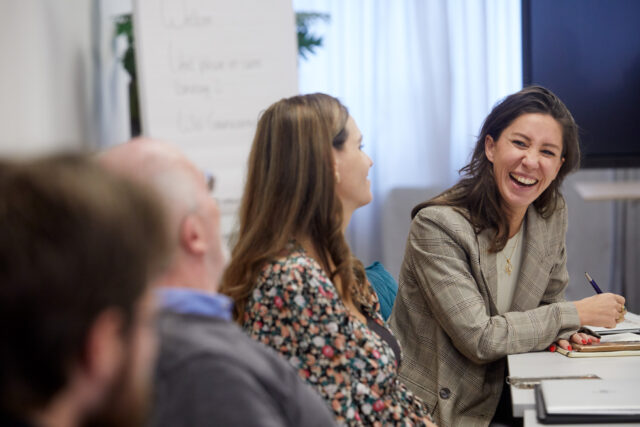
‘I also teach at the Academy for Labor Market Communication . There, a participant entered the partial assignment in ChatGPT. Within a minute she came up with a useful strategy. Not that you didn’t have to do anything about it anymore, but still. I thought that was impressive. But I’m still not afraid that AI will take over the entire economy. As humans we will always continue to seek human connection with each other.’
Kloppenburg : ‘What the development also reveals is our enormous focus on output. We want results as quickly as possible. But certainly in the subject, it is also the process, the journey, that is of value. Writing a text must also be a struggle . That is also educational. You use tools for that, it has always been that way. But if a machine comes along that skips that struggle, I don’t know whether we should be so happy about that.’
Toddling, puzzling
Goudsmit : ‘I’m not really afraid that the creative element will disappear. Although I do think we are moving towards a kind of driver’s license that you have to learn to use.’
‘I think we are moving towards a kind of driver’s license that you have to learn to use.’
Roozen : ‘AI can help you. But what we are here for is employer branding. In other words: looking for the uniqueness of every organization and bringing that out. That search involves craftsmanship. Toddling, puzzling. I’m afraid that if we only use AI, we will all soon look like Kim Kardashian. That immediately makes it uninteresting to me.’
#3. Employer branding in 2023
Schroen : ‘I see a lot that is quite flat. A lot of uniformity. I also think the police video we talked about earlier is fantastic. But these are only sporadic examples. I think we should learn a lot more from B2C and B2B marketing. They are so much further along.’
‘I see a lot that is quite flat. A lot of uniformity.’
Goudsmit : ‘It is also because millions still go to marketing, and several tens of thousands go to recruitment.’
Marion de Vries ( Employer Brand Builders , discussion leader): ‘I recently received a call from an accounting firm, who said: we are goingto add employer branding . The customer asks for it. If I could explain something to them about it.’
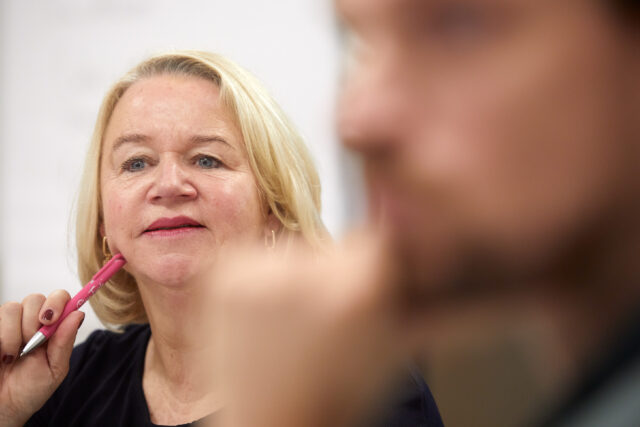
Backer : ‘My allergies really go through the roof. We’re not going to do an audit either, are we? But it also shows that employer branding is still an immature field. It is an expertise, not something extra. That’s why I think it should be taught at colleges.’
‘Employer branding is not an afterthought. That’s why I think it should be taught at colleges.’
Rodenburg : ‘The problem also lies in this: employer branding is often in the communication corner. But it’s about much more than campaigns. It’s about how you build a business. That’s super strategic.’
Booghmans : ‘ Employer branding has also become a catch-all concept. I often spend more time explaining how recruitment marketing works than running a campaign. An HR manager often wants a new colleague yesterday, and a new campaign the day before yesterday. But of course it doesn’t work that way. So it has to be invested at a different level, I think. It is not something for the side, it is a pure specialism.’
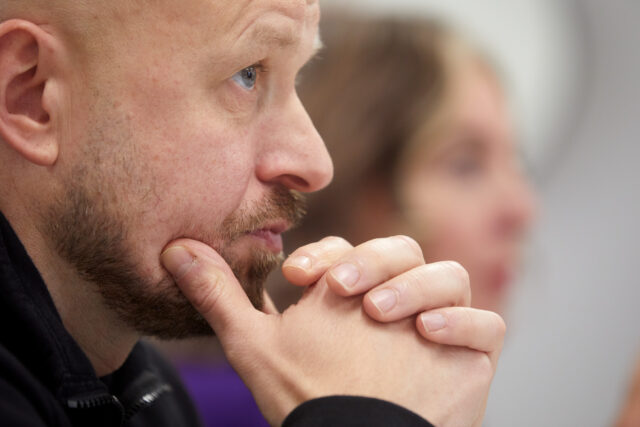
Hensen Verbaten : ‘Employer branding is about influencing attitude and behavior. That is really different from providing information. It’s really strategic. That’s why I think it should be pushed further up in the organization.’
Wierda : ‘ Employer branding has become employer identity . Who are you as an organization? As employer branders, we havenow also become culture builders.’
As employer branders, we have now also become culture builders.’
Kloppenburg : ‘It’s even more than that, I think. It’s not just about what you are like as an employer, it’s about your entire identity. Who you are as an employer, or how you interact with your colleagues, is an application of that. I see this strongly in companies that were founded on a mission. On World Employer Branding Day I heard the story of Vattenfall, who said: we don’t think in terms of an employer brand, we think in terms of our mission. That mission guides both consumers and candidates, who we hire, and how we train them. Then you are essentiallyreducing employer branding and consumer branding to the same story. Very strong.’
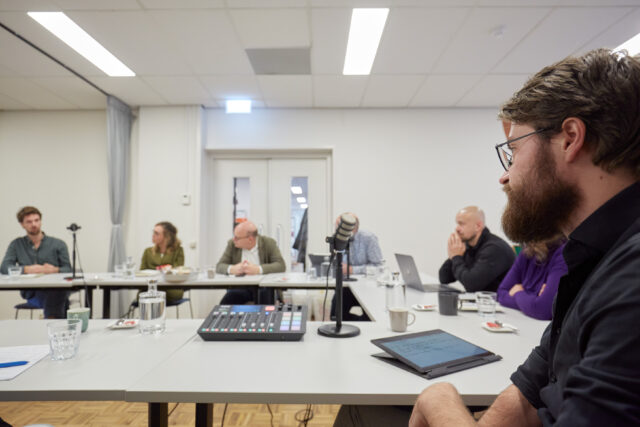
Roozen : ‘But that is why you cannot separate employer branding from HR. Because otherwise you draw them in through the front door with marketing, and then they walk right out the back door because of broken promises. People understand that perfectly.’
‘ Employer branding is the only profession that touches the soul of the organization.’
Rodenburg : ‘That is the best thing about our profession. You always talk to the management, because it is so fundamentally about who you are as an organization. Employer branding is the only profession that touches the soul of the organization. And yes, sometimes we also have to confront: is this who we want to be?’
#4. Specialist or generalist
Roozen : ‘I don’t really think that as an agency we should offer our clients the all-encompassing total package, but that we should create chains of specialists. I recently spoke to someone who said: I don’t see how employer branding and sourcing are related. Well, we know: if you have a bad employer brand, sourcing becomes difficult. We need eachother.’
‘We know: if you have a bad employer brand, sourcing becomes difficult.’
Verhoeks: ‘And it also works vice versa. That sourcer hears everything and knows exactly what is going on about your brand in the external labor market. For example, if you choose certain core values, but we hear from candidates that they do not recognize you in that way at all, then you obviously still have some work to do. This also applies to us: we have the best
collaborations with customers where employer branding is in order. For example, if something has happened, the employer branders will call immediately: have you heard anything about this from candidates?’
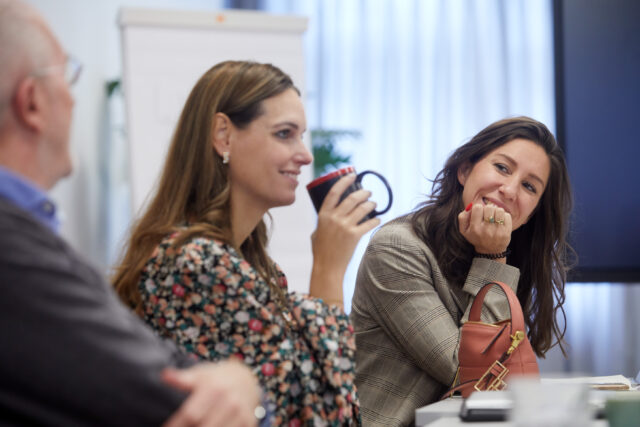
Hensen Verbaten: ‘I notice more and more awareness among organizations. They realize: you can no longer just say that you are so inclusive, while in practice you are not. They ask us to find out what they can really promise, instead of simply requesting to communicate something. In doing so they rely on a specialism.’
#5. Inspiration
Schroen : ‘I see a lot of uniformity. I think the Police campaign is strong because it is not based on reason, but much more on emotion. I think we need to respond more to that. What happens within the brains of the target group?’
‘I think the Police campaign is strong because it is not based on reason, but much more on emotion.’
Kloppenburg : ‘I am very jealous of last year’s Monopoly campaign. They placed bus shelters exactly on the streets that appear in the game. I think this is so strong because it deviates from the standard list of social media, and the choice of media therefore enormously strengthens the power of the campaign. I also see a lot of uniformity in the distribution of communications. It then ends up in a huge mountain of content. I think it’s great when you dare to make different choices.’
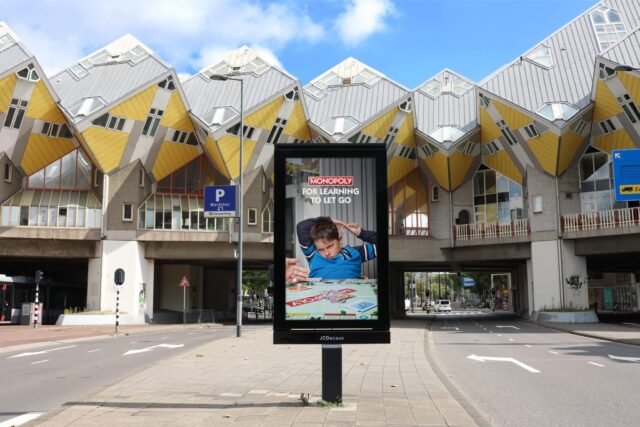
Rodenburg : ‘I notice that many creatives no longer enjoy this profession at all. It is so serious and well thought out, it all has to be so right. Do we dare to do this? It is completely rationalized and crushed in many organizations. It lacks feeling and has often become very risk averse.’
‘Employer branding is completely rationalized and flattened in many organizations.’
Verhoeks : ‘That is also something social, I think. Many people have become afraid: can we still say this?’
Rodenburg : ‘It is the power of creativity, in wording and imagination, needed to touch the heart. I rarely cry when you tell me something, but if you show me something it can happen. It’s not always a matter of money, it’s mainly about time, attention and love, I think.’
Kloppenburg : ‘It is also the media landscape. The whole personalization of social media – down to the level of the individual – is now being restricted. And I’m actually happy with that. That personalization also took away the power from communication. We want to create something that can be talked about. It forces us to create something that stands out. That requires creativity.’
‘That whole personalization also took away the power of communication.’
Booghmans : ‘It has been the case for some time that personalized advertisements are no longer allowed. It didn’t change my targeting. It has made my profession even more interesting. Showing the right content to the right target group at the right time will only become more important. In that sense, I am only happy with the restrictions. It just underlines that it is not something you can just do on the side.’
Short term thinking
Kloppenburg : ‘There is a deeply rooted idea in our profession that what we do costs money and yields nothing. There is so much short-term thinking. I think that also has to do with how our economy is structured. I find ‘post-growth’ thinker Paul Schenderling inspiring. He argues that we should not focus blindly on as many sales as possible, but to look at things in a different way, in which the relationship between people and work becomes important again.’
‘There is a deeply rooted idea in our profession that what we do costs money and yields nothing.’
Schroen : ‘I would like to mention marketing psychologist Christ Coolen . I think we can learn a lot from the way he explains in simple terms what motivates people and how you can change behavior.’
Rodenburg : ‘I like to stick with content strategist Cor Hospes. He has a podcast Hart voor Zaken and a book of the same name , about love for work. The human dimension in a company. And how to release the energy. If you get 25%, the rest will follow automatically. I think that as employer branders we should also focus on that.’
‘If you get 25%, the rest will follow automatically. I think that as employer branders we should focus on that.’
Hensen Verbaten : ‘I follow business coach Tibor Olgers . I find it inspiring how he shows that you can achieve success by focusing on one product or service. Especially daring to choose, that teaches me a lot.’
#6. Heroic act in 2024
Backer : ‘I think that next year will really be about looking at labor differently. Addressing remote, hybrid, retirees and non-standard target groups, other types of contracts.’
Schroen : ‘I would like to see more diversity in media campaigns. And more focus on our customers’ own employees.’
‘I would like to see more diversity in media campaigns. And more focus on our own employees.’
Goudsmit : ‘I have been suffering from the “urge to evangelize” for some time now. But please take this profession seriously for once. I have the impression that all organizations now realize the importance of recruitment. But there are few who really understand how to approach this part.’
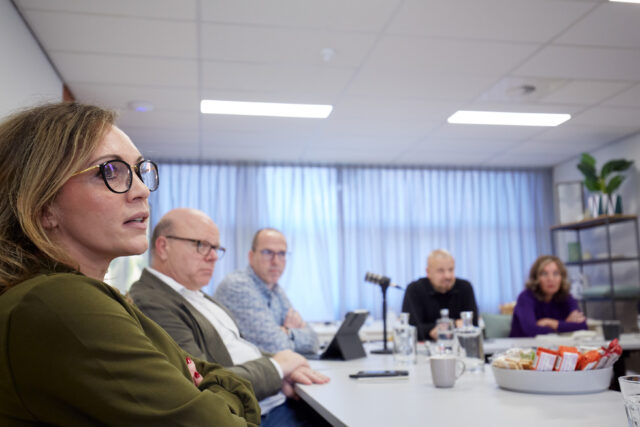
Roozen : ‘We have opted for a clear proposition. I would consider it a heroic act if this was fully implemented next year and became effective for all colleagues.’
‘All organizations now recognize the importance of recruitment. But few really understand how to approach this part.’
Booghmans : ‘I have been an entrepreneur for 4.5 years now. Next year there are a few charities we want to help in. I also enjoy doing it sometimes.’
Share knowledge
Backer : ‘Sharing knowledge, that is my intrinsic motivation. And I want to do that a lot more next year. So that we will hopefully ultimately see more distinctive employer profiles.’
‘Fair Hire not only produces more conversions, it also gives everyone a chance.’
Wierda : ‘We have started Fair Hire Research in recent months, with which we show customers: where are you still missing opportunities? And also: how do you approach people you still miss? Not only because it results in more conversion, but also because it gives everyone a chance.’
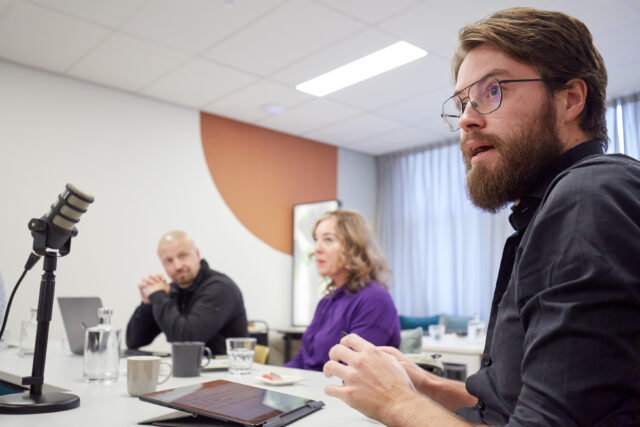
Rodenburg : ‘I would consider it a heroic act if a CEO became responsible for the employer brand. I also always wonder: why are there recruitment managers, but no retention managers? There is a lot of profit to be made there. Also in the naming. I think People & Culture is 100 times better than HR, in any case.’
‘I do see heroes at organizations that are working less vacancy-driven.’
Verhoeks : ‘I see heroes at organizations that dare to invest in talent pooling and work less vacancy-driven.’
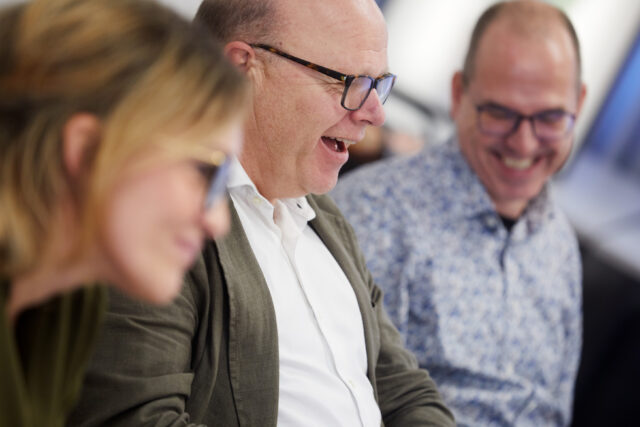
Hensen Verbaten: ‘I sometimes see organizations that want to put something at the end of their communication that we actually take for granted. Such as hybrid working. Then I think: that’s not an asset, is it? Rather, choose something that really makes you unique. A heroic act for 2024 would be to dare to do that.’
‘Hybrid working: that’s not an asset, is it? Rather, choose something that really makes you unique.’
Wierda : ‘We have a minimum number of vacation days. And so people actually send home in December if they have not yet taken enough vacation. This is how we turn a commodity into an asset again, I think. It is really something completely different from an unlimited number of vacation days.’
Read more?
This is the third part of four different round table sessions organized for the 180-page Yard & Yearbook, which was published this month. Would you like to receive a free (digital) copy? Request it here! A report of the round table session on flex will also be published sometime in the coming weeks.

